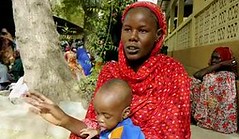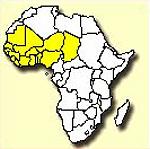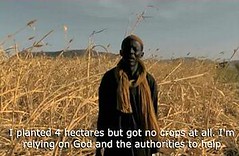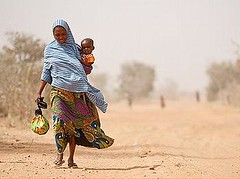 聯合國官員正力勸國際組織立即擴大對於飢民的援助,尤其是西非薩赫爾(Sahel)幾百萬又飢又渴的人民,這也警示著將會出現新一波的人道危機。聯合國兒童基金會(UNICEF)執行長安東尼‧雷克(Anthony Lake)日前在日內瓦與聯合國難民總署(UN High Commissioner for Refugees)和世界衛生組織共同召開記者會表示,「我們全部的人都在呼籲,希望能停止這世界的冷漠和不關心。」
聯合國官員正力勸國際組織立即擴大對於飢民的援助,尤其是西非薩赫爾(Sahel)幾百萬又飢又渴的人民,這也警示著將會出現新一波的人道危機。聯合國兒童基金會(UNICEF)執行長安東尼‧雷克(Anthony Lake)日前在日內瓦與聯合國難民總署(UN High Commissioner for Refugees)和世界衛生組織共同召開記者會表示,「我們全部的人都在呼籲,希望能停止這世界的冷漠和不關心。」
雷克指出,「我知道這已經是陳腔濫調了。我在一些部落格和其它地方看到相關評論說『再說一次,還會再有飢荒;會有更多非洲小孩死於飢餓;再一次我們懇求幫助』。」他呼籲,「我們不要對這些災民只是視為可憐和同情的對象;我們應該支持他們努力求生的勇氣給予支持。」
「那些對於這些事情感到厭倦的人,我們想告訴你,這些飢民和死掉的小孩,不只是數據而已。這些勇敢和這種處境奮戰的人們,他們生存的環境是你我都無法想像的。」雷克強調,現在立刻採取行動,會比等到情況變得惡化之後更有效益。「如果我們現在積極且適當地採取行動,我們可以避免未來的危機,現在開始建立衛生系統、社區健康中心、多鑿一點水源,我們可以替未來建造可能性。」
 薩赫爾(編按:位在非洲撒哈拉沙漠和蘇丹草原之間)的生態氣候和生態地理是跨越非洲大陸,東西介於大西洋和紅海之間,南北則是從薩哈拉沙漠北部到南部的Sudanian 熱帶稀樹大平原。薩赫爾曾經被草原和稀樹所覆蓋,是個有森林和灌叢的地區,但是因為過度開墾、過度放牧和過多人口等造成的土地貧脊和土壤侵蝕,使得地區沙漠化。
薩赫爾(編按:位在非洲撒哈拉沙漠和蘇丹草原之間)的生態氣候和生態地理是跨越非洲大陸,東西介於大西洋和紅海之間,南北則是從薩哈拉沙漠北部到南部的Sudanian 熱帶稀樹大平原。薩赫爾曾經被草原和稀樹所覆蓋,是個有森林和灌叢的地區,但是因為過度開墾、過度放牧和過多人口等造成的土地貧脊和土壤侵蝕,使得地區沙漠化。
薩赫爾地區從西到東包括:塞內加爾、南茅利塔尼亞、馬利共和國、布吉納法索、南阿爾及利亞、尼日爾、北奈及利亞、查德、北喀麥隆、蘇丹、達佛和厄利垂亞。
薩赫爾已經經歷過乾旱,現在進入欠收的季節,而離下一次的收割季節還有好幾個月之久。在下一次收割之前,很有可能需要援助的人口數量會倍增。
剛從查德出訪回來的雷克表示,估計有1500萬人,受到乾旱和薩赫爾地區衝突危機的影響,其中大約150萬孩童面臨嚴重且急性營養不良問題。「幾天之前我在查德一個小鎮並拜訪了當地的健康中心。他們說,今年孩童因嚴重營養不良而被來的比率,高於去年欠收季節時的比率。」
 雷克表示,「現在整個地區都進入所謂的欠收季節,每個家庭去年能採收的農作物都減少,這是非常糟糕的。但是這些家庭的情況特別危急,因為在2010年的乾旱他們就已經賣掉他們所有的家畜,他們的小孩也都從學校輟學。因此在今年的災難中,他們是更弱勢的一群。」
雷克表示,「現在整個地區都進入所謂的欠收季節,每個家庭去年能採收的農作物都減少,這是非常糟糕的。但是這些家庭的情況特別危急,因為在2010年的乾旱他們就已經賣掉他們所有的家畜,他們的小孩也都從學校輟學。因此在今年的災難中,他們是更弱勢的一群。」
歐盟執委會將薩赫爾目前的困境原因歸咎於「氣候變遷和生態系統退化增加了降雨的不確定性」。
歐盟執委會也提出另外兩個原因「長期貧窮」和「人口成長」,薩赫爾的人口成長是全世界之冠。以平均值來看,薩赫爾的人口平均每25年就會倍增,增加了大自然資源和食物供應的壓力。
聯合國難民總署的古特瑞斯表示,薩赫爾的情況是結合乾旱、食物不安全、水源缺乏、環境退化和衝突所造成的結果。「事實上,對於薩赫爾危機的關注是非常少的,大部分國際組織的焦點都在敘利亞內戰。」
世界衛生組織總幹事陳馮富珍將薩赫爾的食物和衛生營養情況視為公共衛生危機,呼籲全世界將這情形變成一次改變薩赫爾情況的機會。他表示,「我們必須問問我們自己,這次的危機可以變成轉機嗎?這就是為什麼我們要將這次的危機讓國際組織們知道,並希望得到國際的關注。」
雷克說明,「去年12月,聯合國組織和其成員國希望可以募得7億2400萬美金作為薩赫爾危機的人道救援基金,但是到目前為止只收到一半的贊助。」
歐盟執委會11日表示,已經增加對於薩赫爾的地區的援助基金,到達約1億6450萬歐元(2億1700萬美元),除此之外已經有2億8700萬歐元(3億7850萬美元)緊急用來購買食物和應付營養不良的問題。歐盟成員將對薩赫爾的災民和食物危機提供更進一步的人道援助。
 美國國務卿希拉蕊3月29日曾表示,美國非常關心薩赫爾的情況,並宣布提供薩赫爾1億2000萬美元的援助最為緊急使用。「加上這筆援助,美國今年已經提供薩赫爾地區兩億元的援助。」
美國國務卿希拉蕊3月29日曾表示,美國非常關心薩赫爾的情況,並宣布提供薩赫爾1億2000萬美元的援助最為緊急使用。「加上這筆援助,美國今年已經提供薩赫爾地區兩億元的援助。」
希拉蕊指出,「我們盡可能提供高營養、高療效的食物給營養不良的小孩。除了提供維持生活的食物,我們也試著幫助弱勢家庭和社區,讓他們可以購買當地附近的食物和使用當地的公共設施;也幫助他們發展小規模的計畫和基礎設施來增加當地的韌性(resilience),以對抗未來的乾旱。」
加拿大是最先對薩赫爾伸出援手的國家之一,在2月即提供了4100萬加幣的援助來幫助食物的供應,也提供獸醫服務和飼料,並解加強當地組織。但是當地需要更多的援助。
西非農民組織(West African Peasants' and Farmers' Network)成員戈塔(Goita)告訴加拿大樂施會,「我們希望加拿大政府用它的影響力來說服其他國家也一起能響應聯合國的呼籲,越快越好,加強當地的農業發展和社區的復原韌性以打破不斷惡性循環的飢荒。」
United Nations officials are urging the international community to extend immediate help to millions of hungry and thirsty people in the Sahel region of West Africa, warning that a humanitarian disaster is near.
"We are appealing, all of us, for an end to global indifference that we have found so far," said Anthony Lake, executive director of the UN Children's Fund, UNICEF. Lake was speaking Tuesday at a news conference in Geneva with officials from the office of the UN High Commissioner for Refugees and the World Health Organization.
"I know that there is a certain fatigue," said Lake. "I have read comments in blogs and elsewhere that 'here we go again; once more a famine; once more African children are dying; once more there is an appeal for help.'"
"Let's not look at them as objects of pity and charity, let's look at them as people we need to support in their brave struggle for survival," pleaded Lake.
"To those who are fatigued, we would say that people and children, of course, are not simply statistics. All these are families fighting courageously in circumstances that few of us can imagine," he said.
Lake stressed that taking action immediately will be more cost-effective than waiting for the situation to deteriorate further.
"By acting vigorously and properly now, we can head off future crises," he said. "By building now in this crisis, health systems, community nutrition centers, more water bore holes, we can build capacity for the future."
The Sahel is the ecoclimatic and biogeographic zone that stretches across the African continent between the Atlantic Ocean and the Red Sea and from the Sahara desert in the north to the Sudanian savannas in the south. The Sahel was once covered in grassland and savanna, with areas of woodland and shrubland, but over-farming, over-grazing, and over-population of marginal lands and natural soil erosion have caused desertification across the region.
The Sahel region includes, from west to east: Senegal, southern Mauritania, Mali, Burkina Faso, southern Algeria, Niger, northern Nigeria, Chad, northern Cameroon, Sudan, Darfur, and Eritrea.
While already suffering from drought, the Sahel is entering the annual lean season and the next possible harvest is months away. It is possible that the number of people in need of assistance may double before the next harvest.
Just back from a visit to Chad, Lake said that of the estimated 15 million people affected by the drought and conflict-related crisis in the Sahel region, about 1.5 million are children who face the prospect of severe acute malnutrition.
"I was in a town called Mao in central Chad a few days ago and visited a nutrition center. They reported that admission rates at the nutritional center for children suffering from severe acute malnutrition are already higher than at any point in last year's lean season," he said.
"This could be very bad and we are now across the region entering the so-called lean season, when families are drawing down the grains that they were able to harvest last year. But these families are in particular peril because in the drought of 2010 they had already sold off livestock, taking their kids out of school. Therefore they are in a weakened position for this year's crisis," said Lake.
In Brussels Wednesday, the European Commission blamed the Sahel's predicament on, "climate change and ecosystem degradation [that] increase the unpredictability of rainfall."
The Commission also blamed "chronic poverty" and on "population growth" that is among the highest in the world. On average, the population of the Sahel doubles every 25 years, increasing pressure on natural resources and the food supply.
High Commissioner for Refugees Antonio Guterres said the situation in the Sahel is the result of the combined effects of drought, food insecurity, water scarcity, environmental degradation and conflict.
"The truth is that there is very little attention to the crisis in the Sahel," said Guterres. "Most of the focus of the international community has been on the Syrian crisis."
Describing the food and nutrition situation in the Sahel as a public health crisis, Margaret Chan, the director-general of the World Health Organization, urged the world to turn the situation into a window of opportunity to improve conditions across the Sahel.
Dr. Chan said, "We need to ask ourselves, can we turn this peril into an opportunity? That is why we would like to bring this crisis to the attention of the international community."
In December, UN agencies and partners appealed for US$724 million to fund the humanitarian response to the Sahel crisis, but only 50 percent of that funding has so far been received, Lake said.
The European Commission said Wednesday that it has increased its development funding to the Sahel region by 164.5 million euros (US$217 million) in addition to the 287 million euros (US$378.5 million) already allocated to respond to emergency food needs and address acute malnutrition. Further humanitarian support to the victims of the Sahel food crisis is given by EU member states.
Saying, "The United States is deeply concerned about the humanitarian emergency in the Sahel," on March 29, U.S. Secretary of State Hillary Clinton announced an additional $120 million in emergency assistance for the region.
"With these funds, the U.S. Government is providing nearly $200 million this fiscal year in humanitarian assistance to the Sahel region," said Clinton.
"We are making highly nutritious therapeutic food available for malnourished children," Clinton said. "In addition to providing life-saving food, we are working to help vulnerable families and communities buy locally-available food and services, while developing small-scale projects and infrastructure that can help build the resilience necessary to withstand future drought."
Canada was one of the countries that acted early, pledging C$41 million in February to help pre-position food supplies, provide veterinary services and fodder, and strengthen local organizations. But more aid is needed.
"We urge the Canadian government to use its influence to persuade other governments to meet the UN's call as early as possible and to increase agricultural development and community resilience programs aimed at breaking the hunger cycle," Goita, of the West African Peasants' and Farmers' Network told Oxfam Canada.




